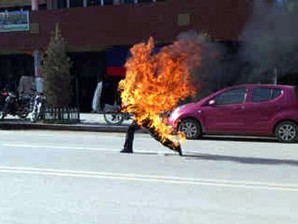Five Tibetans set selves alight in China—exile government

Dorje Rinchen, a farmer in his late 50s, runs after setting himself on fire on the main street in Xiahe in northwestern China’s Gansu province in mid-October this year. On Wednesday, five more Tibetans did the same as an act of protest to free Tibet from Communist China’s decades-long rule. AP/Freetibet.org
DHARAMSHALA, India—Five Tibetans set themselves on fire in China in an unprecedented string of protests ahead of the country’s once-in-a-decade leadership change, the Tibetan exile government said Thursday.
All five took place on Wednesday, the eve of a pivotal week-long Communist Party congress which will end with the transitioning of power to Vice President Xi Jinping, who will govern for the coming decade.
Individual self-immolations to protest Chinese rule in Tibet have occurred regularly since March 2011, but this is the first time such a large number of burnings have happened on the same day.
Three teenaged monks set themselves ablaze in a Tibetan-inhabited area of Aba County in Sichuan province, the focus of previous protests. One of them died on the spot, the press department for the exile government said.
“The self-immolations in Tibet are an appeal to the international community, to the Chinese government and to the Chinese people as human beings to hear their cry for help,” Dicki Chhoyang, information secretary for the government, told AFP.
Article continues after this advertisementIn addition to the three burnings in Sichuan, a fourth occurred in Huangnan prefecture in Qinghai province where a 23-year-old woman self-immolated and a fifth happened in the Tibet Autonomous Region, the exile government said.
Article continues after this advertisementTwo protesters are confirmed dead and the whereabouts of the others are unknown.
“These protests are aimed at sending the next generation of China’s unelected regime a clear signal that Tibetans will continue to fight for their freedom despite China’s efforts to suppress and intimidate them,” Stephanie Brigden, director of the Free Tibet campaign group said in a statement.
The group reported four people had set themselves on fire, while the Radio Free Asia broadcaster reported five and two deaths.
A total of 68 Tibetans have set themselves on fire in the protest, of which 54 have died, according to figures from the government in exile, which has been based in India since Tibetan spiritual leader the Dalai Lama fled Tibet in 1959.
China blames what it calls the “Dalai clique” for fomenting unrest in Tibet and orchestrating the self-immolations.
Last week, UN High Commissioner for Human Rights Navi Pillay urged China to address Tibetans’ grievances saying: “I recognise Tibetans’ intense sense of frustration and despair which has led them to resort to such extreme means”.
Pillay said she was disturbed by “continuing allegations of violence against Tibetans seeking to exercise their fundamental human rights of freedom of expression, association and religion”.
China rebuffed the criticism and expressed “strong dissatisfaction”.
The Tibetan government in exile, which is not recognised by any foreign state, is looking for cause for optimism from the new Chinese leadership under Xi, the 59-year-old son of a Communist revolutionary.
Xi’s father, Xi Zhongxun, met and came to know the Dalai Lama in Beijing in the early 1950s, before the Tibetan spiritual leader fled after a failed uprising.
Xi senior, a party official at the time, later became a liberal vice premier known to be sympathetic towards minorities, and Tibetan exiles and analysts raise the possibility that such thinking may have passed down a generation.
Xi junior’s true political leanings are largely unknown, though he has expressed the government’s routine disdain for the Dalai Lama and also vowed to “smash” any attempt to destroy stability in Tibet.
“We hope that the new leadership will demonstrate greater wisdom by understanding that addressing the issue of Tibet is in China’s long-term interest,” said Chhoyang.
“We are ready at any time, any location to resume dialogue,” she added.
The Dalai Lama and the government in exile call for greater autonomy for Tibet inside China, but Beijing views these demands as a separatist campaign liable to spark further demands for self-governance in other restive regions.